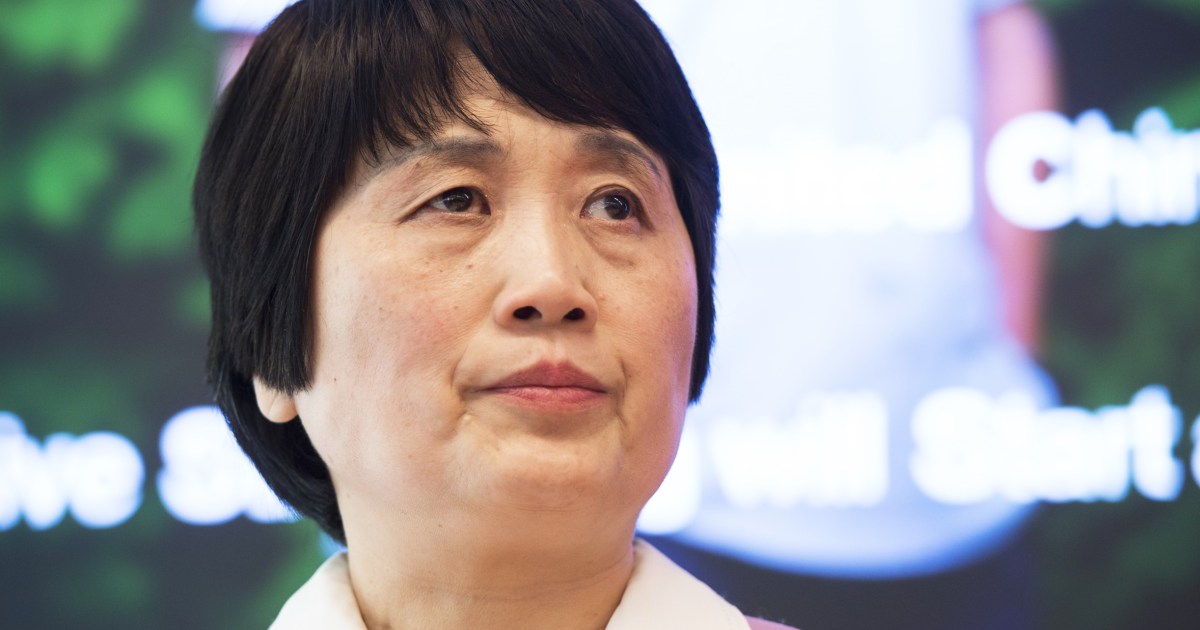
An Asian American scientist who was wrongfully accused of spying for China is speaking out after reaching a lucrative settlement with the U.S. government last week.
Sherry Chen, a Chinese American hydrologist who was arrested in 2014 before her case abruptly collapsed the following year, was awarded Thursday more than $1.5 million in damages for her wrongful prosecution and termination from her job at the National Weather Service (NWS).
Chen, one of several Asian Americans across science and academia who have been wrongfully accused of espionage, said in a statement that she sees the settlement as a step toward accountability.
“I have finally achieved justice in my case. It’s long overdue. I hope that my settlement inspires other Chinese Americans who were wrongly investigated and prosecuted to continue to fight for justice,” Chen told NBC News in an email.
According to the American Civil Liberties Union, which backed Chen, the hydrologist will receive $550,000 from the Commerce Department and an annuity over 10 years valued at $1.25 million. Additionally, a senior official from the department will meet with Chen and provide her a letter recognizing her accomplishments during her tenure at the NWS, the ACLU said.
The Commerce Department declined NBC News’ request for comment, but Salvador A. Dominguez, first assistant U.S. attorney at the U.S. Attorney’s Office for the Southern District of Ohio, said in a statement to NBC News, “We are pleased the parties reached a mutually-agreed resolution of this lawsuit.”
The settlement concludes Chen’s legal battles against the government, the ACLU said. Roughly eight years ago, Chen, the only woman of color and only Asian American working at her Ohio-based NWS office at the time, was accused of economic espionage. The allegation was prompted by a 2012 visit to China during which she connected with a former classmate who worked in the Chinese government. Chen said she contacted the former classmate because she was seeking to help in a dispute between the local water bureau and a family member who worked on a water pipeline project, according to court documents. The family member was allegedly not paid for the work, she said.
Her classmate also asked her about how the U.S. financed water projects, a topic Chen didn’t know much about at the time, but she sought out public information from her work superiors when she returned to Ohio, according to her own account. She briefly continued the conversation with her former classmate over email, but the exchange, one she thought was a casual one, would eventually get the hydrologist flagged, Chen previously said.
A week before the trial, which was set to begin in March 2015, federal prosecutors abruptly dropped all charges without explanation.
“My lifetime of outstanding scientific work was destroyed. And my entire life was shattered,” Chen previously recalled to NBC News. “I was arrested in front of my co-workers, led out of a building in handcuffs, and held in solitary confinement at a courthouse jail.”
A former Department of Commerce security unit behind Chen’s case, the now-terminated Investigations and Threat Management Service (ITMS), has since been accused by advocates and officials of misconduct and opening investigations based on race and national origin, among other offenses. A Senate review from July 2021 said ITMS had mutated “into a rogue, unaccountable police force across multiple presidential administrations.” Citing Chen’s case, the report showed ITMS conducted investigations typically reserved for domestic law enforcement agencies, and did so in “an overzealous manner whereby agents abused steps in the investigative process.”
“The Department conducted a thorough review of ITMS, published a detailed accounting of its findings, disbanded the unit, and is implementing a series of policy changes to ensure greater accountability in its security operations,” a Commerce Department spokesperson previously told NBC News in a statement.
Other findings came to light during Chen’s previous employment proceedings. Among the allegations made against Chen was that she had used a stolen password to download information about U.S. dams and passed it off to a Chinese official. It was revealed during the proceedings, however, that Commerce officials may have disregarded evidence which would have exonerated her, including the fact that the password was an officewide one. But, Chen had still been unable to get back to work, her lawyers said.
Neither the Commerce Department nor the DOJ commented further on Chen’s ordeal.
In her employment suit, a judge from the Merit Service Protection Board (MSPB) previously sided with Chen in 2018, ordering her reinstatement plus back pay. However, the Commerce Department appealed the decision and placed her on administrative leave. After a second suit, an administrative complaint to Commerce and DOJ, the parties went into settlement negotiations.
As part of the settlement, Chen is retiring from the NWS, her lawyers said.
Chen’s win has prompted an outpouring of support from several Asian American and civil rights organizations, in addition to lawmakers. Rep. Judy Chu, D-Calif., said in a statement Monday that she was pleased the ordeal reached a “fair conclusion.”
“It has been over a decade since Sherry Chen was accused of espionage, yet another Chinese American who was targeted because of their race, this time by the Department of Commerce’s rogue ITMS unit,” Chu said in a statement. “This historic settlement is a welcome symbol to restore justice to Ms. Chen, and I’m pleased that at long last, Ms. Chen’s ordeal has reached a fair conclusion.”
Chen is among several Asian Americans across science and academia who have been accused of espionage, experts said. Under the Trump administration, the government formally implemented a security program, aimed at addressing the national security issue, entitled the “China Initiative.” The highly controversial program was accused by scholars and advocates of encouraging racial profiling, and was sunsetted by the Biden administration earlier this year.
“While I remain focused on the evolving, significant threat that the government of China poses, I have concluded that this initiative is not the right approach,” Matthew Olsen, head of the National Security Division at the DOJ, said in a speech at George Mason University earlier this year.
But the anxiety and fear of being racially profiled still lingers among many academics, studies show.
Research by the nonprofit Committee of 100, published in October, shows that more than 50% of scientists of Chinese descent “feel considerable fear and/or anxiety” that they are under U.S. government surveillance.
Source: | This article originally belongs to Nbcnews.com









